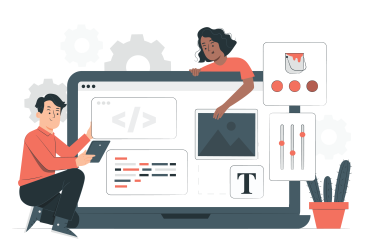Description
🎯 Why Use Bootstrap?
- Super easy to use
- Saves a lot of time
- Makes your site look professional
- Automatically adjusts your site for mobile, tablet, and desktop (responsive design)
🧩 Bootstrap Includes:
- CSS classes (for layout, text, colors, spacing, etc.)
- JavaScript plugins (like modals, sliders, dropdowns)
- Grid system (12-column layout to arrange content)
- Pre-designed components like:
- Buttons
- Cards
- Navbars
- Alerts
- Forms
- Carousels
📦 How to Get Bootstrap:
- Use the CDN (quickest way for beginners)
- Or download and host it locally
- Or install with npm if you're working on advanced projects
Course content
Introduction to Bootstrap & Setup
Bootstrap is a popular front-end framework for developing responsive and mobile-first websites.
This section covers how to include Bootstrap in a project via CDN or local files and how to structure the HTML to utilize Bootstrap's components and utilities.
Introduction to Bootstrap & Setup
Bootstrap is a popular front-end framework for developing responsive and mobile-first websites.
This section covers how to include Bootstrap in a project via CDN or local files and how to structure the HTML to utilize Bootstrap's components and utilities.
Introduction to Bootstrap & Setup
Bootstrap is a popular front-end framework for developing responsive and mobile-first websites.
This section covers how to include Bootstrap in a project via CDN or local files and how to structure the HTML to utilize Bootstrap's components and utilities.
Container & Container-fluid
Bootstrap containers are used to wrap content and align it within the layout.
The container class provides a fixed-width layout that adapts at breakpoints, while container-fluid spans the full width of the viewport.
Bootstrap Grid System
The grid system is a core part of Bootstrap’s layout structure.
It uses rows and columns based on a 12-column layout to create flexible and responsive page designs, supporting various screen sizes through breakpoints.
Typography
Bootstrap includes predefined classes for text formatting, alignment, font sizes, weights, headings, and more, enabling consistent typography across a website with minimal effort.
Tables & Colors
Bootstrap provides styled table classes with features like striped rows, hover states, and borders.
It also offers utility classes for text and background colors using a standard color palette.
Images & z-index
Images in Bootstrap can be styled for responsiveness, alignment, and shape. z-index is used to manage the stacking order of overlapping elements within the layout.
Alerts, Buttons, and Button Groups
Alerts are dismissible messages for user feedback.
Bootstrap buttons come in various styles and sizes.
Button groups allow multiple buttons to be grouped together for organized user interaction.
Badges, Progress Bars, Spinners
Badges are small count or label indicators.
Progress bars visually represent completion percentages.
Spinners indicate loading or processing activity and come in multiple styles and sizes.
Forms
Bootstrap simplifies form layout and styling, providing responsive classes for inputs, labels, checkboxes, radios, and validation states, ensuring consistent and accessible forms.
Pagination & List Groups
Pagination enables navigation across pages or items.
List groups are used to display a series of related content items in a structured list format with styling and interactivity.
Cards & Dropdowns
Cards are flexible containers used for content and layout with headers, footers, and image support. Dropdowns offer toggleable menus that appear when triggered by a button or link.
Carousel
A carousel is a slideshow component used to cycle through elements like images or text, with built-in support for indicators, controls, and transitions.
Nav & Navbar
Navs are navigation components like tabs and pills. The navbar is a responsive and flexible navigation bar that includes branding, links, dropdowns, and togglers for mobile menus.
Modals
Modals are dialog boxes or pop-ups that appear on top of the current page to display content or forms without navigating away, supporting animations and different sizes.
Modals
Modals are dialog boxes or pop-ups that appear on top of the current page to display content or forms without navigating away, supporting animations and different sizes.
Collapse, Tooltips, Popovers
Collapse toggles visibility of content like accordions. Tooltips display informative text on hover or focus. Popovers are similar but can contain more content like titles and paragraphs.
Toasts & Flexbox
Toasts are small, dismissible notifications that appear briefly.
Bootstrap's Flexbox utilities allow flexible layout designs with alignment, direction, and spacing adjustments.
Offcanvas
Offcanvas components are sliding panels that appear from the sides of the screen and can contain navigation, content, or forms, often used in mobile menus.
Utility Classes
Bootstrap provides a wide range of utility classes for spacing, positioning, sizing, display, and more, allowing quick and efficient styling without custom CSS.
Dark Mode & Scrollspy
Dark Mode enables switching to a dark-themed interface. Scrollspy automatically updates navigation links based on scroll position, providing dynamic interaction with page sections.
Final Project
This part focuses on applying Bootstrap concepts to begin building a complete responsive website layout, starting with structure, navigation, and initial content areas.
This final stage completes the website with interactive components, styling refinements, and responsive behavior, integrating all previously learned Bootstrap features.


